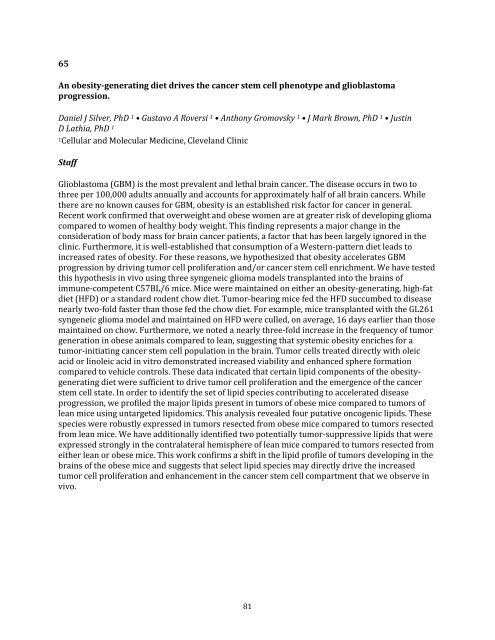2017 Cardiovascular Research Day Abstract Book
Create successful ePaper yourself
Turn your PDF publications into a flip-book with our unique Google optimized e-Paper software.
65<br />
An obesity-generating diet drives the cancer stem cell phenotype and glioblastoma<br />
progression.<br />
Daniel J Silver, PhD 1 • Gustavo A Roversi 1 • Anthony Gromovsky 1 • J Mark Brown, PhD 1 • Justin<br />
D Lathia, PhD 1<br />
1Cellular and Molecular Medicine, Cleveland Clinic<br />
Staff<br />
Glioblastoma (GBM) is the most prevalent and lethal brain cancer. The disease occurs in two to<br />
three per 100,000 adults annually and accounts for approximately half of all brain cancers. While<br />
there are no known causes for GBM, obesity is an established risk factor for cancer in general.<br />
Recent work confirmed that overweight and obese women are at greater risk of developing glioma<br />
compared to women of healthy body weight. This finding represents a major change in the<br />
consideration of body mass for brain cancer patients, a factor that has been largely ignored in the<br />
clinic. Furthermore, it is well-established that consumption of a Western-pattern diet leads to<br />
increased rates of obesity. For these reasons, we hypothesized that obesity accelerates GBM<br />
progression by driving tumor cell proliferation and/or cancer stem cell enrichment. We have tested<br />
this hypothesis in vivo using three syngeneic glioma models transplanted into the brains of<br />
immune-competent C57BL/6 mice. Mice were maintained on either an obesity-generating, high-fat<br />
diet (HFD) or a standard rodent chow diet. Tumor-bearing mice fed the HFD succumbed to disease<br />
nearly two-fold faster than those fed the chow diet. For example, mice transplanted with the GL261<br />
syngeneic glioma model and maintained on HFD were culled, on average, 16 days earlier than those<br />
maintained on chow. Furthermore, we noted a nearly three-fold increase in the frequency of tumor<br />
generation in obese animals compared to lean, suggesting that systemic obesity enriches for a<br />
tumor-initiating cancer stem cell population in the brain. Tumor cells treated directly with oleic<br />
acid or linoleic acid in vitro demonstrated increased viability and enhanced sphere formation<br />
compared to vehicle controls. These data indicated that certain lipid components of the obesitygenerating<br />
diet were sufficient to drive tumor cell proliferation and the emergence of the cancer<br />
stem cell state. In order to identify the set of lipid species contributing to accelerated disease<br />
progression, we profiled the major lipids present in tumors of obese mice compared to tumors of<br />
lean mice using untargeted lipidomics. This analysis revealed four putative oncogenic lipids. These<br />
species were robustly expressed in tumors resected from obese mice compared to tumors resected<br />
from lean mice. We have additionally identified two potentially tumor-suppressive lipids that were<br />
expressed strongly in the contralateral hemisphere of lean mice compared to tumors resected from<br />
either lean or obese mice. This work confirms a shift in the lipid profile of tumors developing in the<br />
brains of the obese mice and suggests that select lipid species may directly drive the increased<br />
tumor cell proliferation and enhancement in the cancer stem cell compartment that we observe in<br />
vivo.<br />
81


